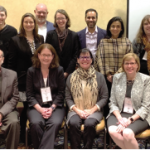In an academic medical center, the role of clinical educator is essential and increasingly complex. “To sustain the clinician educator workforce and to promote their scholarly contributions to medical education, guidance and support for faculty pursuing careers as clinician educators [are] critical,” write Jessica R. Berman, MD, and colleagues from the Hospital for Special Surgery and Weill Cornell Medical College, Cornell University in New York, in their latest article.
For 15 years, the Rheumatology Research Foundation of the American College of Rheumatology (ACR) has addressed this gap in career development through the Clinician Scholar Educator (CSE) Award. Dr. Berman and colleagues have examined the evolution of the CSE Award and documented the individual and institutional effects. Their findings were published in the November 2016 issue of Arthritis Care & Research. Researchers surveyed 90% (56) of the 60 CSE award recipients regarding their post-award activities and promotions. Data were also collected from the annual progress reports awardees submit to the Foundation.
This three-year career development award, first awarded in July 1999, is designed to support a recipient’s educational research and advance their career development. Additional benefits to rheumatology have included the enhancement of education for musculoskeletal and rheumatic diseases and a positive effect on trainee exposure to, as well as recruitment into, careers in the specialty.
The grant program has evolved. Initial awardees were more senior faculty who used the award for career redevelopment. In 2008, the award was increased to support non-salary expenditures, such as tuition for a certificate or degree-granting program. Recent award recipients have been early to mid-career faculty who are developing educational “products,” such as curricula and webinars for the rheumatology community. Additionally, awardees showcase their work at the ACR/ARHP Annual Meeting.
The success of the grant program is undeniable, especially in its impact on rheumatology education. According to survey responses, two-thirds of respondents spend up to 30% of their time on educational activities, and one-third spends more than 30%. Staying true to the hybrid role of clinical educator, none of the awardees are engaged in fulltime medical education. The survey also found this group to be productive in terms of educational scholarship, with 52% of recipients publishing a total of 86 medical education papers.
Additionally, 26 of respondents received an academic promotion after the award, and 11 awardees have earned advanced degrees.
An Unexpected Result
“One unanticipated benefit of the CSE program has been the organic development of a community of educational scholars who meet to collaborate and to support each other, their junior colleagues, and rheumatology training at large,” note the authors.
The survey respondents praise the benefits of the peer group that has developed through the grant program. Past CSE Award recipients have formally and informally mentored award applicants and served on the Clinician Scholar Educator Advisory Panel, which was formed in 2008, mentoring current awardees.
“The CSE awardees can be seen to have formed a community of practice. … Communities of practice for medical educators can improve educational problem solving, target educational project development and increase the educational expertise of community members,” write the authors.
“This unique and highly successful endeavor may serve as a model for other medical societies,” conclude the authors. “The CSE Award created the nidus of a community of rheumatology scholar educators, whose role has extended from that of providing local, institutional expertise … to serving as a consulting resource at the national level for the ACR and its membership.”
For more on the CSE program and projects, read the full article.
Berman JR, O’Rourke KS, Kolasinski SL, et al. Rheumatology Research Foundation clinician scholar educator award: Fifteen years promoting rheumatology educators and education. Arthritis Care Res (Hoboken). 2016 Feb 11. doi: 10.1002/acr.22858. [Epub ahead of print]



